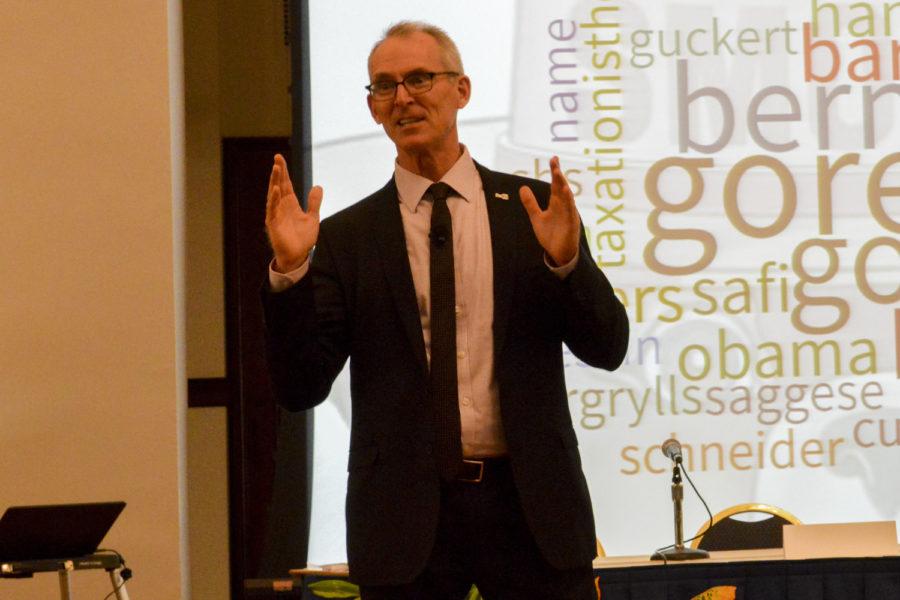Highlighting the existing political lines at Pitt was not what Samuel Ressin had in mind while planning his Polarization vs. the Planet event.
Ressin — the president of the Climate Stewardship Society — said the event was supposed to showcase climate change and ways to show bipartisan support on the issue — but the College Democrats decided not to participate.
“[The College Dems] felt that the event was a little too right-leaning for them, which is unfortunate because … a lot of conversations about the environment typically have been dominated by those on the left,” Ressin said.
The event — held Friday in the Connolly Ballroom of Alumni Hall — attracted about 50 attendees and featured several politicians and academics who discussed climate change and the political polarization surrounding the issue.
A number of groups participated in the planning process — including the Climate Stewardship Society, Pitt College Republicans, Pitt Vets, Black Action Society, Students for Liberty and Free the Planet.
Charlotte Goldbach, president of the Pitt College Democrats and a senior political science and communications major, said the group decided not to be involved since the discussion cannot be bipartisan when “it is visibly a primarily conservative group.”
“We wanted to participate,” she said. “Dems firmly believes that climate change is a huge issue, and as members of the [Pitt’s] Fossil Free Coalition, [we] did not see a path for productive conversation with the groups that were involved when we were approached.”
Later, during a survey segment at the event, when asked to choose between the Republican and Democratic Party — and only given those two choices — 58 percent of audience members said they would side with the Democratic Party, while the remaining 42 percent said they align with the Republican Party.
Gordon R. Mitchell, an associate professor in Pitt’s Department of Communications who spoke at the event, said polarization in Congress on issues such as climate change has increased in recent years and and has contributed to representatives making decisions based more on party lines rather than evidence.
“Polarization can produce extreme viewpoints when you have like-minded others reinforcing those viewpoints,” Mitchell said.
Mitchell said “motivated reasoning” — when a person comes up with evidence to support a conclusion rather than forming a conclusion based on evidence — is a common trend in climate change politics.
“Yes, you do research, but the research that you’re doing is simply trying to find confirmatory evidence that backs up your conclusion,” Mitchell said.
Mitchell cited the desire to conform as a factor in how people form political opinions. He invited several audience members to participate in a recreation of the Asch experiment — created by psychologist Solomon Asch in 1951. The experiment tests how peer pressure to conform influences the judgment and individuality of a test subject answering questions.
“It’s a relevant experiment because what we’re observing here is the psychological conformity effect. So what happens when someone actually occupies an echochamber and, as [Ressin] was saying, they’re just talking to people who agree with their viewpoint?” Mitchell said.
Ressin wanted to show ways to involve differing viewpoints in the conversation about climate change — especially conservatives, who he said have been largely left out of it.
“The problem is that the polarization in this country has trickled down to universities and has prevented people from talking to each other and even caring about their peers,” Ressin said. “Just because holding an opinion outside the norm or outside your ‘tribe’ is considered outrageous.”
Bob Inglis — a former U.S. Republican representative who also spoke at the event — said conservatives don’t like to talk about climate change because they feel they are attacked when they talk about it. They also tend to focus on the economic consequences of an issue when making a rational decision, rather than those such as health, he said.
“But what we have going on here is a situation where conservatives are not seeing the cost associated with burning the fossil fuels,” Inglis said.
Lorenzo Riboni, a senior administration of justice major and vice president of Pitt College Republicans, said he admires Inglis because he sticks to what he believes in regardless of the heat he gets for it.
“He lost his seat in Congress and he did what he thought was right and it was hard for him,” Riboni said.
Alex Richardson, a senior natural science major and registered Democrat, said she was excited to hear that Inglis — a Republican who believes in climate change — was speaking at the event.
“I was like, ‘Wow, it sounds like it is going to be a really good mature conversation of people with different viewpoints’ and it would be really great to hear them all in one place,” Richardson said.
Richardson said she did wish there had been a little more “controversy” with more speakers with opposing viewpoints present.
“Everything seemed very safe and everyone there was kind of on the same plane,” she said.
Harley McCain — a senior and environmental science major — said it was “a shame” the College Dems didn’t want to participate and felt it showed they were not willing to look at all the options for the best solution.
“If it’s something you care about, prove it,” McCain said.



